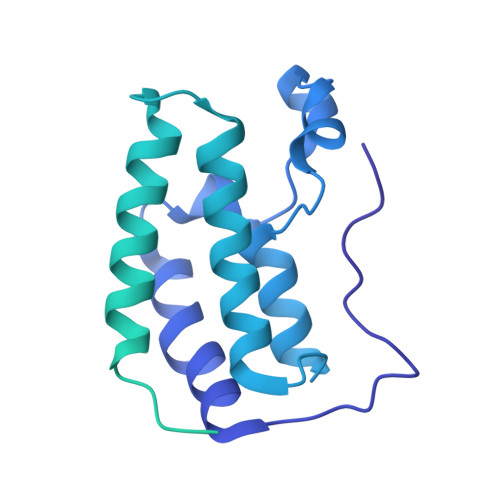Spatially constrained tandem bromodomain inhibition bolsters sustained repression of BRD4 transcriptional activity for TNBC cell growth.
Ren, C., Zhang, G., Han, F., Fu, S., Cao, Y., Zhang, F., Zhang, Q., Meslamani, J., Xu, Y., Ji, D., Cao, L., Zhou, Q., Cheung, K.L., Sharma, R., Babault, N., Yi, Z., Zhang, W., Walsh, M.J., Zeng, L., Zhou, M.M.(2018) Proc Natl Acad Sci U S A 115: 7949-7954
- PubMed: 30012592
- DOI: https://doi.org/10.1073/pnas.1720000115
- Primary Citation of Related Structures:
6DJC, 6DNE - PubMed Abstract:
The importance of BET protein BRD4 in gene transcription is well recognized through the study of chemical modulation of its characteristic tandem bromodomain (BrD) binding to lysine-acetylated histones and transcription factors. However, while monovalent inhibition of BRD4 by BET BrD inhibitors such as JQ1 blocks growth of hematopoietic cancers, it is much less effective generally in solid tumors. Here, we report a thienodiazepine-based bivalent BrD inhibitor, MS645, that affords spatially constrained tandem BrD inhibition and consequently sustained repression of BRD4 transcriptional activity in blocking proliferation of solid-tumor cells including a panel of triple-negative breast cancer (TNBC) cells. MS645 blocks BRD4 binding to transcription enhancer/mediator proteins MED1 and YY1 with potency superior to monovalent BET inhibitors, resulting in down-regulation of proinflammatory cytokines and genes for cell-cycle control and DNA damage repair that are largely unaffected by monovalent BrD inhibition. Our study suggests a therapeutic strategy to maximally control BRD4 activity for rapid growth of solid-tumor TNBC cells.
- Department of Pharmacological Sciences, Icahn School of Medicine at Mount Sinai, New York, NY 10029.
Organizational Affiliation:

















